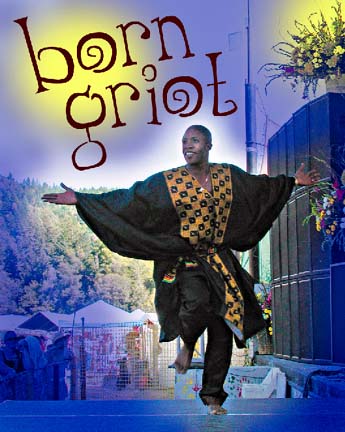|
COVER STORY | IN THE NEWS | ART BEAT | PUBLISHER | THE HUM | CALENDAR Sept. 9, 2004
by BOB DORAN THERE'S SOMETHING REGAL ABOUT Assane Kouyate [photo above] and his twin brother Ousseynou. And it's not just the robes they wear -- you sense it when they dance, and hear it when they sing their traditional African songs. But they do not come from a royal line -- they are griots, following an ancient tradition. "My music and dance comes from my ancestors," Assane explained when he came to see me at my Arcata office. "I am a born griot. Griot is like a journalist, a history journalist, using singing and dancing. [My ancestor] Balla Fasseke Kouyate was the first popular griot in West Africa. He had a lot of children who went all over Africa, to Mali, Cote d'Ivoire, Senegal, many, many generations ago." In the old days, griots worked for the kings of Africa, singing and dancing in court and traveling through the land to tell stories from history and current events. The job and the traditions were passed on from father to son. "The last name, Kouyate, is very, very famous all over Africa. When people hear the name, they say, `Oh, you djialy, we're supposed to give you money.' Djialy is [another name] for griot," he continued, bouncing his baby son on his knee. "My son is a direct griot -- he will learn from me." While Assane's father was born a griot, he chose another path in life, leaving village life behind to move to the Senegal's capital city, Dakar, where he found great success in the textile business. "My father's father played ngoni, a harp, like a small kora, and he taught my father to play. When you have children, you teach them your music. It's the tradition. But my father was so busy with his business, he had little time for music." An uncle helped carry the music forward, teaching the twins' older brother, the family's first born son, how to play kora. The twins learned to dance from family on their mother's side, who are also from a griot line. The twins' grandparents were among of the first Africans to take traditional Senegalese music and dance to an international audience. The twins started traveling with a dance group as young boys, first going to Mali. By the age of 20, they had developed considerable skills, enough to audition for positions in the top dance company, Le Ballet National du Senegal. "A lot of people auditioned, hundreds, but that day they chose only me and my twin, and three others. That was our big start." In 1995 the dance troupe came to the United States, hitting 27 states in three months. "We came back again in 1998, and I decided to stay. I wanted to have my own thing. We griots, the people pick up the dance and music from us; the children, they learn from us." Assane is convinced that many African-Americans come from a griot lineage but they don't know it. "I can tell," he says. "Especially when I hear the singing in church, the high voices [in gospel music]. Griot is so big, but things have changed so much that it was lost. A lot of children hear the music or see us dance, and they know they must learn this tradition." You might have seen the twins perform at Reggae on the River a few years back when they amazed a Sunday morning crowd with a show that included improvised guest vocals from none other than Joan Baez, whose son, Gabriel, was part of the Djialy Kunda Kouyate band. At the time the twins were living in the San Francisco Bay Area. Since then Assane has relocated to Arcata, where he lives with his wife, Dawn, and their 5-month-old son, named Ousseynou, after his uncle. Friday, Sept. 10, the twins and the Djialy Kunda Kouyate band return to Southern Humboldt for an evening of West African music and dance at the Mateel Community Center. "Friday night we will have my local band from Humboldt County play with us; we have Ken Lawrence playing bass," noted Assane. "And also many African musicians will join us: Samba Geesay from Senegal, he will play talking drum, Mohammed Kouyate from Guinea will play balaphone, Salif Kone from Burkina Faso, he will be on djembe and we have a singer, rapper, Junior Kabba from Sierra Leone. It will be good music, and we will dance, yes, we will dance." West African Night at the Mateel begins at 7 p.m. with a traditional African dinner followed by a performance at 9 p.m. Admission for the show is $20, dinner $7. For more information, call the Mateel at 923-3368. For more on Djialy Kunda Kouyate, see djialykundakouyate.tripod.com. Bob Doran COVER STORY | IN THE NEWS | ART BEAT | PUBLISHER | THE HUM | CALENDAR Comments? © Copyright 2004, North Coast Journal, Inc. |

